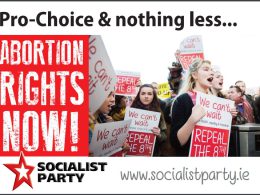By Jonathan Diebold
After the recent elections, Fianna Fáil and Fine Gael sought to form a fresh coalition to rule for another five years. The question on all the commentators’ lips was who will be the next mudguard to replace the decimated Green Party? Will it once again be Labour? Or are the Social Democrats ready to sell their soul? Will, against all odds, Sinn Féin be invited into power, having finally swung hard enough to the right to be palatable to these parties? In the end it was none of these groups.
A more wretched nest…
“Profoundly corrupt to a degree that was nothing short of breathtaking.” This is the finding of the 2011 report of the Moriarty Tribunal in relation to Michael Lowry, former FG minister and now an independent TD. Lowry, a 70 year-old veteran of Dáil politics, led the Regional Group in its negotiations to prop up five more years of FF and FG.
Among the Regional Independents, Lowry is relatively unexceptional: the group is a rogues gallery of right-wing populists, pro-government sycophants, and FG castoffs too toxic even for them. Members include people like Verona Murphy, who was ousted from FG after saying that immigrants as young as “three or four years old” could be brainwashed by ISIS. As part of the deal, she was elected Ceann Comhairle – a position with far-reaching powers to decide the Dáil’s agenda.
Noel Graelish, who once described all African asylum seekers as “spongers,” is another member of the group. For his support, Graelish has been awarded a seat at the cabinet. Gillian O’Toole, a former FG member, received the endorsement of Sharon Keogan, one of the most far-right members of the Oireachtas, who argued that autistic people should be microchipped.
One might wonder how the Government could stoop any lower, but they answered this by inviting the Healy Rae brothers, Michael and Danny, two anti-choice millionaire TDs who deny climate change and oppose adoptions by same-sex couples. One of them will have a seat at the cabinet table.
The idea of any of these TDs having any say over government policy is abhorrent. What this will mean for abortion rights, the safety of migrants and LGBTQ+ people, for workers’ rights in the face of housing and cost-of-living crises, for the Occupied Territories Bill, only time will tell. But this is not a departure from the real politics of FG and FF. Many of these TDs left these parties not over political differences, but because they were vocal about how they really felt at the wrong time. The fact that FF and FG are now inviting such people to join a government implies that they will be more willing to lean further to the right than they had dared to in recent years.
Change must come from below
Such people are the natural coalition partners for FF and FG. However, some might see this as an argument for left-leaning parties to fight to enter coalition, as the Green Party and the Labour Party before them, have done. But what did the Greens accomplish in government? Ireland is drifting further and further from its climate targets, which were already far too conservative. At the start of the decade, the state needed to achieve a 5% reduction in emissions every year to hit its 2030 goal. Now, that number has risen to 8% – and continues to rise.
Meanwhile, the Greens backed the Government in ending the ban on no-fault evictions, funding the inhumane greyhound racing industry, opening up our ports for the importation of fracked liquified natural gas, and presided over the multiple chronic crises present in the country, from health to housing to cost of living, all of which have only got worse.
This tranche of independents propping up FF and FG only reveals that the faux-progressive facade that these parties of Irish capitalism tried to put forward at times in recent years is nothing more than that. The change that is needed will not come from influencing these parties in the Dáil. All the important, progressive changes which have been won, from Repeal, to marriage equality, to the rescinding of the water charges, were won on the streets, by ordinary people, forcing the Government to implement these changes. That is what is needed now.
This must be linked to building a left-wing, socialist alternative that breaks with the parties and “Independents” that have facilitated the Gaza genocide, created the housing crisis, are whipping up racism and division and stand for a capitalist status quo built on inequality and division.












